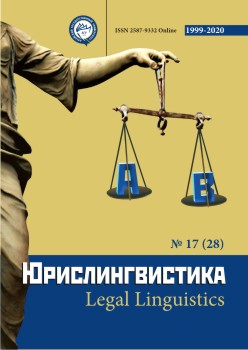The Terms "Science" and "Scolarly Endeavor” in Legal Texts and Doctrine
Abstract
The study examines the concept of "science" through the prism of the language of law and legal doctrine. The authors claim the need to put down the working definition of science in legal acts, since this term has a practical meaning when qualifying certain relations as scientific. The article draws attention to the vagueness of the concept of "science" in the Russian legislation, the absence of such a feature as the creative nature of scientific knowledge in the legal definition.
Downloads
Metrics
References
Городов О.А. Правовая инноватика. Правовое регулирование инновационной деятельности. СПб., 2008.
Международные нормативные акты ЮНЕСКО. М., 1993.
Мурзин Д.В. Проблемы правового регулирования научной деятельности как деятельности творческой / Российский юридический журнал. – 2019. – № 4.– С. 167-175.
Мурзин Д.В. Правовая природа результатов научной деятельности / Российское право: образование, практика и наука. – 2019. – № 2. – С. 15.
Рекомендация ЮНЕСКО 2017 «В отношении научной деятельности и научных работников». / Организация Объединенных Наций по вопросам образования, науки и культуры. Акты Генеральной конференции. Т.1. Резолюция. 39-я сессия. Париж, 2018.
Стёпин В.С. Философия науки. Общие проблемы. М., 2006.
Федеральный закон от 23.08.1996 N 127-ФЗ (ред. от 31.07.2020) "О науке и государственной научно-технической политике"/ Собрание законодательства РФ. 26.08.1996 г., N 35, ст. 4137.
Черникова И.В. Природа науки и критерии научности / Гуманитарный вектор. – 2012. – № 3. – С. 94.
Черникова И.В. Философия и история науки. Томск, 2011.
References
Chernikova, I.V. (2012). The nature of science and criteria of scientific character. Humanitarian vector. No. 3. (in Russian).
Chernikova I.V. (2011). Philosophy and history of science. Tomsk (in Russian).
Federal Law of 23.08.1996 N 127-FZ (as amended on 31.07.2020) "On Science and State Scientific and Technical Policy". Collected Legislation of the Russian Federation. 26.08.1996. No. 35. Art. 4137 (in Russian).
Gorodov, O.A. (2008). Legal innovation. Legal regulation of innovation. St. Petersburg (in Russian).
International normative acts of UNESCO (1993). Moscow (in Russian).
Murzin, D.V. (2019). Problems of legal regulation of scientific activity as creative activity. Russian legal journal. No. 4 (in Russian).
Murzin, D.V. (2019). The legal nature of the results of scientific activity. Russian law: education, practice and science. No. 2 (in Russian).
Stepin, V. S. (2006). Philosophy of Science. Common problems. Moscow (in Russian).
UNESCO Recommendation 2017 “Concerning Scientific Activities and Scientific Workers” (2018). United Nations Educational, Scientific and Cultural Organization. General Conference Records. Vol. 1. Resolution. 39th session. Paris (in Russian).
Copyright (c) 2020 Антон Васильев, Шпоппер Дариуш

This work is licensed under a Creative Commons Attribution 4.0 International License.
The authors, which are published in this journal, agree to the following conditions:
1. Authors retain the copyright to the work and transfer to the journal the right of the first publication along with the work, at the same time licensing it under the terms of the Creative Commons Attribution License, which allows others to distribute this work with the obligatory indication of the authorship of this work and a link to the original publication in this journal .
2. The authors retain the right to enter into separate, additional contractual agreements for the non-exclusive distribution of the version of the work published by this journal (for example, to place it in the university depository or to publish it in a book), with reference to the original publication in this journal.
3. Authors are allowed to post their work on the Internet (for example, in a university repository or on their personal website) before and during the review process of this journal, as this may lead to a productive discussion, as well as more links to this published work (See The Effect of Open Access).











